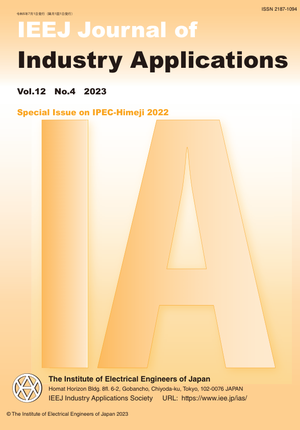Reduced Order Modeling of Half-Wave Rectified Brushless Synchronous Motor for Model-Based Design
Reduced Order Modeling of Half-Wave Rectified Brushless Synchronous Motor for Model-Based Design
カテゴリ: 論文誌(論文単位)
グループ名: 【D】産業応用部門(英文)
発行日: 2023/07/01
タイトル(英語): Reduced Order Modeling of Half-Wave Rectified Brushless Synchronous Motor for Model-Based Design
著者名: Takahiro Koga (Technical Division, ANSYS Japan K.K./Electrical Engineer and Computer Science, Division of Science and Technology, Nagasaki University), Takashi Abe (Electrical Engineer and Computer Science, Division of Science and Technology, Nagasaki Uni
著者名(英語): Takahiro Koga (Technical Division, ANSYS Japan K.K./Electrical Engineer and Computer Science, Division of Science and Technology, Nagasaki University), Takashi Abe (Electrical Engineer and Computer Science, Division of Science and Technology, Nagasaki University), Yoshitsugu Otomo (Electrical Engineer and Computer Science, Division of Science and Technology, Nagasaki University), Masaki Yamamoto (Electrical Engineer and Computer Science, Division of Science and Technology, Nagasaki University), Marius Rosu (ANSYS, Inc.)
キーワード: variable field flux,half-wave rectified brushless excitation,brushless synchronous motor,reduced order model,behavior model,model-based design
要約(英語): This paper presents a reduced order modeling technology and the application of a half-wave rectified brushless synchronous motor for model-based design (MBD). The motor contains a field winding that is single phase short circuited through a diode, instead of a brush, at the rotor. Therefore, the motor features a maintenance free, brushless structure and easily variable field flux operation. However, the motor must be coupled with the circuit to consider the on/off behavior of the diode using electromagnetic simulations. For this, we propose a reduced order model (ROM) modeling method that reproduces the behavior of a motor generated from electromagnetic analysis to use it for MBD while maintaining the simulation accuracy of the motor. The motor characteristics can be simulated in a short period of time with a pulse width modulation (PWM) inverter switching drive and control strategy, such as maximum torque control, by using the proposed ROM modeling method. We compare the simulation results of the proposed ROM with the results of an electromagnetic finite element analysis (FEA) and experimental measurement conducted with a prototype motor. We clarify the characteristics of the proposed ROM in the motor and reproduce the same behavior in a simulation within a duration shorter than that required by the electromagnetic FEA. Finally, we demonstrate the superiority of the proposed method.
本誌: IEEJ Journal of Industry Applications Vol.12 No.4 (2023) Special Issue on “IPEC-Himeji 2022”
本誌掲載ページ: 826-834 p
原稿種別: 論文/英語
電子版へのリンク: https://www.jstage.jst.go.jp/article/ieejjia/12/4/12_22011214/_article/-char/ja/
受取状況を読み込めませんでした


